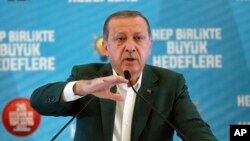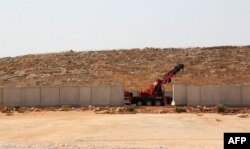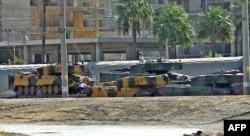Turkish President Recep Tayyip Erdogan has announced the start of Turkish military operation into Syria's Idlib province.
"There is a serious operation in Idlib at the moment, and this will continue," Erdogan announced in a speech Saturday to his party members.
The military offensive is aimed at ending the jihadist control of the Idlib area. Much of Idlib is controlled by the jihadist Tahrir al-Sham alliance, which is made up of large elements of a former al-Qaida affiliate that changed its name last year from the al-Nusra Front.
"We have to help our brothers who arrived in Idlib after fleeing Aleppo. The necessary step was taken, and it is ongoing," Erdogan said. "The FSA [Free Syrian Army] is currently carrying out the operation, and our soldiers are not there."
According to some local reports, FSA forces have started entering Idlib and already have engaged in fighting with the jihadists.
Bolstering forces
The Turkish military has been bolstering its forces for weeks along the Idlib border. Local media reports said parts of the Turkish-built frontier wall had been removed ahead of an expected military operation, which could start as early as Saturday night.
Erdogan said the current operation was receiving air support from Russia.
Ankara, along with Moscow and Tehran, agreed in Astana to create a de-escalation zone in Idlib. Tahrir al-Sham is strongly opposed to the move, vowing to continue its fight against the Syrian regime.
Even though Ankara is a strong supporter of the Syrian opposition, it increasingly is cooperating in Syria with Tehran and Moscow, which both back the Syrian regime. Erdogan has met with his Iranian and Russian counterparts during the past 10 days to discuss the Syrian civil war.
The Astana agreement to create a de-escalation zone in Idlib could help to avert a major threat to Turkey, former Turkish Ambassador Unal Cevikoz, who now heads the Ankara Policy Center, said.
Cevikoz said Ankara fears that if the Syrian regime moves against the rebels in Idlib, as it did in Aleppo, Turkey could face a humanitarian crisis.
"If that kind of tragedy like Aleppo happens in Idlib, there would certainly be a new flow of refugees, and all these people in the Idlib area would find refuge in Turkey. ... Their only exit is toward Turkey," said Cevikoz.
Humanitarian crisis
Currently, Turkey is hosting about 3 million refugees from Iraq and Syria. Security experts warn Turkey would face not only a humanitarian crisis but also a security threat, with many jihadists based in Idlib.
With Ankara being one of the main backers of the Syrian rebels, its role is seen as crucial by Moscow and Tehran in helping to create a de-escalation zone. According to local reports, Turkey's military forces and rebels will focus on securing Idlib, while the hinterland will be under Russian and Iranian control.
Last year, Turkish forces backing FSA elements entered Syria with Moscow's tacit support to remove Islamic State forces and Kurdish forces from its border. A large Turkish military presence remains in Syria, despite Ankara's declaring an end to Operation Euphrates Shield.
Observers warn of the risk of mission creep in the current military undertaking.
Idlib borders Afrin, a region under control by a Syrian Kurdish militia of the YPG. Ankara considers the militia to be terrorists linked to the Kurdish insurgent PKK group, which has been fighting the Turkish state for three decades.
"We will never allow the formation of a terror corridor along our border with Syria," Erdogan said Saturday — a reference that observers suggested was aimed at both jihadists and the YPG.






